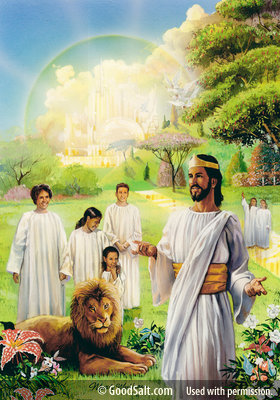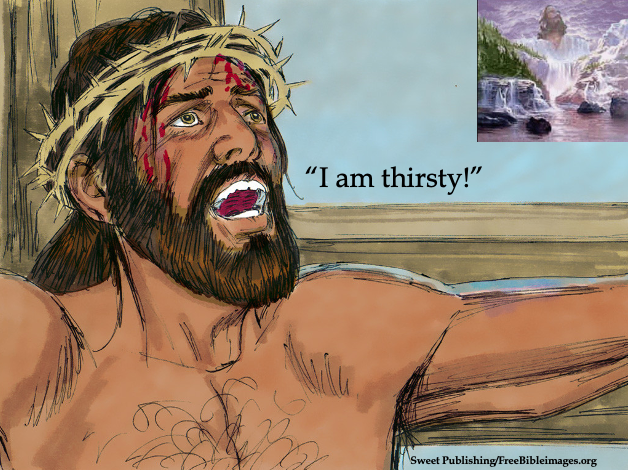“And He said to me, ‘I am the Alpha and the Omega, the Beginning and the End. I will give of the fountain of the water of life freely to him who thirsts.’” Revelation 21:6
After the apostle John begins to describe the new heaven and new earth, and the New Jerusalem (21:1-5), the apostle John designates three categories of people (21:6-8). 1 The first category is seen in verse 6: “And He said to me, ‘I am the Alpha and the Omega, the Beginning and the End. I will give of the fountain of the water of life freely to him who thirsts.’” (Revelation 21:6). The promise in this verse refers to all who believe in Christ. They will all enter the new earth and New Jerusalem (21:1-5).
The Lord Jesus says to John, “I am the Alpha and the Omega, the Beginning and the End.” (21:6a). “The Alpha and Omega” are the first and last letters of the Greek alphabet, and signify here, Jesus’ eternality. Christ is the Originator (“the Beginning”) and Terminator (“the End”) of all things, 2 and therefore He can be trusted.
Because Jesus exists eternally, He can offer eternal life freely to whoever thirsts. “I will give of the fountain of the water of life freely to him who thirsts.” (21:6b). The phrase “water of life” is like the imagery Jesus used with the Samaritan woman at the well. “10 Jesus answered and said to her, ‘If you knew the gift of God, and who it is who says to you, ‘Give Me a drink,’ you would have asked Him, and He would have given you living water… 14 but whoever drinks of the water that I shall give him will never thirst. But the water that I shall give him will become in him a fountain of water springing up into everlasting life.” (John 4:10, 14). The “water of life” is eternal life.
Jesus offers eternal life “freely” (dōrean) or “without payment” 3 or cost to “him who thirsts” (21:6b). The book of Revelation offers eternal life “freely” or without cost (cf. 1:5; 7:14; 21:6; 22:17) 4 because it has already been paid for by Jesus Who “washed us from our sins in His own blood” when He died in our place on the cross and rose from the dead (Revelation 1:5; cf. 7:14; I Corinthians 15:3-6). This is also the case throughout the New Testament where eternal life or salvation is presented as a free gift that is received through faith alone in Christ alone (John 4:10-14; Romans 3:24; 4:5; 6:23b; Ephesians 2:8-9; Revelation 22:17; et al.). Everyone who believes in Jesus Christ alone for “the water of life” (eternal life) acquires it the moment they believe (cf. John 3:15-16, 36; 4:13-14; 5:24; 6:40, 47; 11:25-26; et al.).
While eternal life is offered freely in the New Testament, the next verse informs us that the reward inheritance is costly (cf. Matthew 19:27-30; Colossians 3:23-24). It is in this verse that John addresses the second group of people: “He who overcomes shall inherit all things, and I will be his God and he shall be My son.” (Revelation 21:7). The word “overcomes” comes from the Greek word nikaō which means to “be victor, conquer, overcome, prevail.” 5 The Lord Jesus is challenging those who received eternal life as a free gift by believing in Jesus (21:6), to remain faithful to Christ until the end of their lives so they may “inherit all things” (21:7a; cf. 2:10b, 25-27; Colossians 3:23-24), including wearing special white garments (3:4-5), ruling with Christ (2:26-27; 3:21; cf. 2 Timothy 2:12), eating the fruit of the tree of life (2:7), eating hidden manna (2:17), receiving a white stone engraved with your own special name that only the Lord and you will know (2:17), and receiving a special entrance into the New Jerusalem (21:7a; cf. 22:14).
Dillow observes that the book of Revelation repeatedly contrasts the faithful overcoming believer in Jesus with the unfaithful believer in Jesus. For example, Revelation 2:16 versus 2:7; 2:14-16 versus 2:17; 2:18-23 versus 2:24-29; 3:1-3 versus 3:4-6; 3:11 versus 3:12; 3:14-19 versus 3:21. 6
Jesus promises the overcoming believer that He “will be his God and he shall be My son” who will co-rule with the Davidic King (21:7b; cf. 2 Samuel 7; Psalm 2; Romans 8:14, 17b). 7 The phrase “I will be his God and he shall be My son” is “defined elsewhere as a statement of special honor, not regeneration. The Davidic Covenant promised to David’s Son, Solomon, ‘I will be a Father to him, and he will be a son to Me’ (2 Samuel 7:14). The intent of the phrase was to signify installation as the king.
“On His resurrection from the dead, Jesus was invested with the title ‘Son’ (Acts 13:33), and this was because His humility involved total obedience to the Father’s will (Philippians 2:5-10). Similarly, we arrive at the state of full sonship (Greek huioi, not tekna, ‘children’) by a life of obedience. Our union with Him, according to the writer of the Epistle to the Hebrews, means our path to glory is the same as His. Because of His obedience He was entitled to the designation ‘Son of God,’ King of Israel. ‘Thou has loved righteousness and hated lawlessness; therefore God, thy God, has anointed thee with the oil of gladness above thy companions’ (Hebrews 1:9).
“A similar thought regarding sonship is expressed in Hebrews 11:16, ‘Therefore God is not ashamed to be called their God.’ Of course, in the heavenly city God will be the God of all, both faithful and unfaithful Christians (Revelation 21:3), but it is apparently possible for us to live life in such a way that God is proud to be called our God. Evidently the writer has the title ‘I am the God of Abraham, Isaac, and Jacob’ in mind. This sense fits well [with] the conditional aspect of sonship in Revelation. John’s meaning is simply, ‘Because you have lived a life of constant fellowship with Me,’ God will say, ‘I am proud to be known as your God.’
“The idea here is that God is ‘proud’ to be known as ‘our God,’ because we have persevered to the final hour in contrast to other Christians who are sons but not obedient sons, and who will draw back from Him in shame at His coming (I John 2:28) and lose what they have accomplished (Mark 4:25; Revelation 3:11).” 8
This is the only time in John’s writings where he uses the term “son” (huios) to refer to a person other than Christ (Revelation 21:7b). The normal term in John’s writings for a Christian is “children” (tekna). 9 So, this is a unique relationship inherited by overcomers in the Christian life whereby “God will dwell with him at an increased level of intimacy like a father with his son.” 10
Hence, in the world to come, overcomers or “heirs” would be treated as God’s adult “sons” (Revelation 21:7). In John’s society, a child could not obtain his inheritance until he reached the age of civil responsibility as established by the law. He might be potentially wealthy through all the years of his youth, but when the “child” became a full grown “son,” his potential wealth would become actual wealth, and he could enter into legal possession of his inheritance.
The New Testament doctrine of co-heirship supports this as a distinction is made between “entering” the Kingdom of God (new earth) through childlike faith alone in Christ alone for His free gift of eternal life (Matthew 18:3; Mark 10:14-15; Luke 18:16-17; John 3:5-16; Revelation 21:6) and “inheriting” the new earth through faithful trust and obedience to Christ until the end of one’s life on earth (Matthew 5:3; 19:27-30; Romans 8:17b; 2 Timothy 2:12; James 2:5; Revelation 2:26-27; 3:21; 20:4, 6; cf. Exodus 12:48-49; Numbers 18:20-24; 36:7-9; Deuteronomy 21:15-17; I Corinthians 6:9-11; Galatians 5:19-21; Ephesians 5:5-6). 11
All who freely drank of the water of life (21:6), John called “children” or “born ones” (tekna; cf. John 1:12; I John 2:12), but those who became full-grown and matured through faithful obedience he called adult “sons” (huios). 12 In the day of the new heaven and new Earth, and the New Jerusalem, only those believers who overcame through faithful obedience could say not merely “I am here,” but “these are mine.”
The first two groups of people in these verses included believers in Jesus, but the third and final group of people refers to nonbelievers. “But the cowardly, sinners, unbelieving, abominable, murderers, sexually immoral, sorcerers, idolaters, and all liars shall have their part in the lake which burns with fire and brimstone, which is the second death.” (Revelation 21:8). This verse is simply saying that in the new heaven and earth, and New Jerusalem, there are no more “cowardly, sinners, unbelieving, abominable, murderers, sexually immoral, sorcerers, idolaters, and all liars” because they are all confined to “the lake which burns with fire and brimstone.”
This verse is saying nothing about born again believers in Jesus who have done such things because their sins are now gone because they are forgiven, immortal, and sinless (Acts 10:43; 2:13-14; I Corinthians 15:35-57; 2 Corinthians 5:17; Ephesians 5:26-27; I John 3:1-3). For instance, King Solomon ended his life as an idolator (I Kings 11:1-10), yet he will still be with God on the new earth. God used Solomon to author three books of the Bible: Proverbs (Solomon was the principal author), Song of Solomon, and Ecclesiastes. The Bible says that the human authors of the Bible were “holy men of God” who “spoke as they were moved by the Holy Spirit” (2 Peter 1:21). Even though Solomon was an idolater, the Bible says he was a “holy” man of God. How can this be? He is “holy” in God’s eyes because he has been set apart from his sin and shame by virtue of his faith in the coming Messiah who would die for all his sins – including the sin of idolatry (cf. Isaiah 53; Colossians 2:13-14; Hebrews 10:10, 14).
Likewise, eventhough King David had committed adultery and murder (2 Samuel 11:14-27), the Bible refers to David as an example of those who are justified (declared totally righteous before God) by faith alone in Christ alone apart from any works. “5 But to him who does not work but believes on Him who justifies the ungodly, his faith is accounted for righteousness, 6 just as David also describes the blessedness of the man to whom God imputes righteousness apart from works: 7 ‘Blessed are those whose lawless deeds are forgiven, and whose sins are covered; 8 Blessed is the man to whom the Lord shall not impute sin’” (Romans 4:5-8; cf. Psalms 32:1-2). Paul quotes David (Romans 4:7-8) who wrote in Psalm 32:1-2 of the blessedness of forgiveness as he looked ahead to the death and resurrection of Jesus Christ which would pay the penalty for the sin of the world (John 1:29), including David’s adultery and murder (cf. Psalm 16:8-11; Acts 2:24-36; Colossians 2:13-14).
Paul is saying that the righteousness of Jesus Christ was credited to David and all who believed in His coming death and resurrection in the Old Testament (Romans 4:5-8; cf. Genesis 15:6; Isaiah 61:10; John 8:56; Hebrews 11:26). So, when a person in the Old Testament or in the New Testament believes in the coming Messiah, Jesus Christ, he or she is covered with the righteousness of Jesus Christ so that God no longer sees their sin, He sees the perfect righteousness of His Son (Genesis 15:6; Romans 3:21-4:25; 2 Corinthians 5:21).
By God’s grace, all believers who have failed Him, will be on the new earth and/or New Jerusalem because God does not fail them (2 Timothy 2:13). However, only those believers who faithfully endure (overcome) to the end will “inherit all things” such as prominence, rulership, the joy of the Messiah’s rule, and commendation (cf. Matthew 25:20-23).
Since “the lake which burns with fire and brimstone” (21:8b) still exists after the passing away of the present heaven and earth (Revelation 21:1; cf. 2 Peter 3:10-13), this reaffirms that hell is eternal, and there is no such thing as the annihilation of nonbelievers. All those who rejected Christ will suffer torment in the lake of fire forever and ever (Revelation 20:10-15). Constable understands this also to mean that the lake of fire “is probably not in the center of the present earth, nor is it connected to this earth spatially. Therefore, it will exist separately from the new heaven and new earth and the New Jerusalem.” 13
Which of these three groups of people will you be among? Believers in Jesus who are unfaithful yet on the new earth (21:6), believers who are faithful and greatly rewarded (21:7), or those who did not believe in Jesus and are confined to the lake of fire forever (21:8)? We are not promised tomorrow on earth. Decide today which of these three groups you want to be among.
Prayer: Lord Jesus, thank You for revealing these three groups of people who will exist in the eternal state so we may prepare for what is coming. For those of us who believe in Jesus, please help us rely on Your Holy Spirit to remain faithful to You till the end of our lives on earth so we may be able to inherit all Your promised rewards with which to honor You for all eternity. For those who do not believe in Jesus, please remove the Satanic blinders that keep them from seeing You are the eternal God who freely offers them eternal life as a gift for them to receive by believing in You alone. Use those of us who believe in You to spread Your good news to those who are perishing without You so they can believe in You Lord Jesus and possess eternal life. Also use us to teach new believers to follow You as Your disciple so they may receive Your inheritance rewards. In Your mighty name we pray, Lord Jesus. Amen.
ENDNOTES:
1.Joseph Dillow, Final Destiny: The Future Reign of The Servant Kings: Fourth Revised Edition (Grace Theology Press, 2018 Kindle Edition), pg. 676.
2. Tom Constable, Notes on Revelation, 2017 Edition, pg. 238.
3. Walter Bauer, A Greek-English Lexicon of the New Testament and Other Early Christian Literature: Third Edition (BDAG) revised and edited by Frederick William Danker (Chicago: University of Chicago Press, 2000 Kindle Edition), pg. 266.
4. Dillow, pg. 676.
5. Bauer, pg. 673.
6. Dillow, pp. 677, 1058.
7. Bob Vacendak; Robert Wilkin; J. Bond; Gary Derickson; Brad Doskocil; Zane Hodges; Dwight Hunt; Shawn Leach; The Grace New Testament Commentary: Revised Edition (Grace Evangelical Society, Kindle Edition, 2019), pg. 1584.
8. Dillow, pg. 677.
9. Vacendak, pg. 1584.
10. Tony Evans, CSB Bibles by Holman. The Tony Evans Bible Commentary (B & H Publishing Group, Kindle Edition, 2019), pg. 2421.
11. Zane C. Hodges, Grace in Eclipse: A Study on Eternal Rewards (Grace Evangelical Society, 2016 Kindle Edition), pp. 99-118.
12. Dillow, pg. 729 cites William R. Newell, Romans: Verse by Verse (Chicago: Moody Press, 1938), pg. 314; Henry Alford, “Romans,” in Alford’s Greek Testament: An Exegetical and Critical Commentary (Bellingham, WA: Logos Bible Software, 2010), 2:391; Frederic Louis Godet and A. Cousin, Commentary on St. Paul’s Epistle to the Romans, 2 Vols.(Bellingham, WA: Logos Bible Software, 2009), pg. 311.
13. Constable, pg. 239 cites Robert A. Peterson, “Does the Bible Annihilationism?” Bibliotheca Sacra 156:621 (January – March 1999), pp. 25-26.



